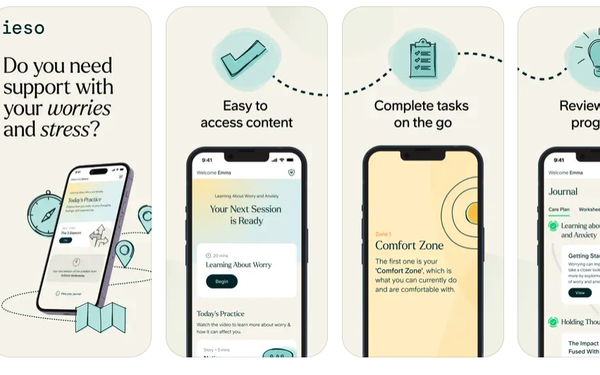
AI-driven mental health therapy reduces anxiety in 82% of patients
-- at up to eight times fewer hours than with human therapists.
Those results, from a study of 300 patients conducted by Ieso Digital Health in collaboration with the UK’s National
Health Service, bode well for the telehealth therapy company as it prepares to enter the U.S. market.
Unlike in the UK, where Ieso has already offered telehealth with human therapists through
NHS for over a decade, the AI service will be its only U.S. offering.
But there will be human backup, just in case.
Dr. Alyssa Dietz, head of U.S. clinical strategy for
Ieso, tells Pharma & Health Insider that, while the company’s original plan was for the service to be 100% AI, the research showed that “the market’s just not ready for
that.”
advertisement
advertisement
“Computers or AI can deliver the content, but humans deliver the care,” she states. Yet, while 94% of participants in the UK study “really appreciated having the
opportunity to speak to a clinician or a member support representative if they desired it, very few [15%] actually took us up on that offer.”
Ieso’s U.S. pilots with healthcare
systems commenced during the past year, with a new one involving “a large academic medical center in a family medicine clinic” set to go live in the next couple of months, Dr. Dietz
says.
Ieso plans to sell its service directly to health systems and health insurers, possibly partnering with a telehealth service already doing one-on-one mental health therapy and thus
providing the human element that Ieso already has on its own in the UK.
Moe than 750,00 hours of human telehealth therapy in that country has provided Ieso with a flood of data that it pours
into the AI.
Danah Tangen, senior vice president, U.S. market development, explains that this info has been a key factor in helping the AI become quicker than human therapy.
“In
the U.S. in particular,” she adds, “therapy varies tremendously between providers -- different theoretical orientations, different skill levels of providers, and different settings, which
can all impact how effective therapy is for an individual.
“When an individual uses our program, they are guaranteed to receive a minimum floor of evidence-based strategies that they can
implement in their life.”
In addition, Tangen says, the AI therapy is “more concentrated and fast-acting.”
In “a traditional one-to one therapy session, there
are pleasantries exchanged, people asking how your weekend was, and making arrangements for the next session,” she notes, with the result being that “only about 18 minutes of a 50-minute
session is intervention content.” With AI therapy, though, “you're not going to be exchanging pleasantries and asking about the weekend, or how the weather was, or did you find the place
all right? Rather, the time is spent laser-focused on learning new skills, learning new information, and practicing applying those to your daily life.”
The AI service should be ready for
U.S. deployment around a year from now, Tangen says.
Since Ieso is not making any treatment claims, no FDA authorization is needed, she explains. “This program…is intended to
support people who are living with symptoms of stress, anxiety, and worry. It's not intended to be a treatment product.”
On the marketing front, though Ieso will only sell the
“software as a medical device” product on a business-to-business basis, it will partner with healthcare systems and insurers on getting word of the AI therapy out to consumers.
“We have a suite of materials in development that we can work together to get folks activated.” Dr. Dietz says. “We've explored a number of different models. For example, with
health systems, we're looking at automated EHR [electronic health records] marketing…after people are determined to meet qualification criteria.”
Tangen adds that Ieso has much UK
marketing experience in driving not just product awareness or even product use, but in driving actual outcomes in improving symptoms of stress and anxiety. “In the UK, we are paid based on
outcomes,” she explains. “So a lot of our marketing expertise comes from finding not only the right patients who are best suited for the product, but the patient who will respond to
specific messages that are going to have a positive clinical outcome.
“The materials that we've created are going to help target the right audience, the people who not only need support
in a way that maybe they haven't had access to in the past, and are going to drive that positive outcome.”